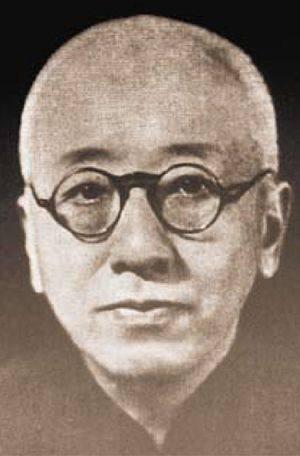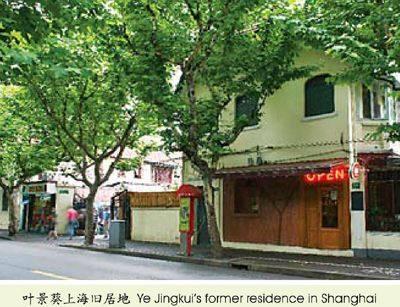叶景葵:高风世或无
凤子



叶景葵(1874—1949),字揆初,号卷庵,浙江杭州人。光绪癸卯年(1903)进士。辛亥革命后,弃官就商,走上实业救国的道路,担任浙江兴业银行上海总行董事长达三十年,是著名的银行家。
在民国的金融业发展中,“叶氏”的名字鲜明地浮现,除了银行家的风采之外,更缘于其在另一片书香弥漫的世界中所留下的印迹,深刻到令人难以忘怀。左手金钱,右手书籍,“书香银行家”是很多人给予叶氏最贴切的称呼。
叶氏一生酷爱读书藏书,《小谟觞馆诗集注》是其购藏的第一部书。那年他刚十八,“得东城讲舍月课奖银七元,不足,向先母乞三元,遂得此书”。
1917年,藏书家吴昌绶嫁女,挑出所藏四十种明刊及旧抄善本,标价千元求售,充当嫁资。叶氏听闻后大方出手,从此引发数十年搜集与整理古籍之“癖好”。但是,叶氏并没有停留在秘籍珍玩的层次,而是别具匠心地以名家稿本、抄本及批校书为收藏对象。数十年苦心经营,叶氏倾其积蓄,藏书两千八百多部,计三万余册。严可均辑《全上古三代秦汉三国六朝文》、惠栋作《周易本义辩证》手稿、王念孙父子合校《管子》等,皆借用其所藏。
叶氏最珍贵的稿本要数从杭州抱经堂购得的顾祖禹《读史方舆纪要》手稿。叶氏刚拿到这部被书虫蛀过的“世间孤本”时,是一大包碎烂不堪的故纸。叶氏“灯下排目整理,剔除蠹虫蛀虫不下数百”,接着请修书高手修补,费时两年,使濒于毁灭的珍品重现,并在著名学者钱穆、张其昀等协助下,考订出手稿为顾氏原稿。
“八一三”以后,沪上图书文献大量流失海内外。叶氏亲眼目睹了一些亲朋故友的藏书,如邓邦述“群碧楼”、宗舜年“咫园”、沈曾植“海日楼”、曹元忠“笺经室”等,在战火中毁亡殆尽。
1937年,叶景葵赴武汉公干,而寓所却临近火线,藏书面临被毁的危险。张元济在隆隆炮声中,到叶家收拾整理。叶氏闻讯后深为感动,并致函称谢。顾廷龙认为,在此尺牍中,叶氏“第一次透露欲将个人藏书创办私人图书馆的意愿”。的确,这则书史佳话成为上海私立合众图书馆创办的一个重要契机。
张元济与叶景葵结识于张氏创办的通艺学堂,叶氏当时为学员。张氏挽叶氏诗云:“京洛论交始,今逾五十春。维新百日尽,通艺几人存?”张氏主持的商务编译所,从1913年始多次选举叶氏为董事,共事中两人交往渐深,相互推重。对于张氏的藏书实践,叶氏极为赞赏:“海内藏书家,能各就乡先哲之遗著,加意收集,又能出其私藏归诸公众,则事得系统,可以积小成大,化零为整,于全国文献,实有裨补。愿后来者,皆以菊翁(张元济)为师也。”由此可见,叶氏邀请张氏同为合众发起人,并不是偶然的。
1937年11月5日,叶景葵在致张元济的信函中第一次提到创办私人图书馆的意向,“菊丈台鉴,顷接通丈(陈叔通)信,知长者于危险之下为葵理故书,感惶无地”。信中还流露出了叶氏初丧妻室的悲伤:“近岁室人物故,私计不再购书,并拟订将难得之本。一为整比捐入可以共信之图书馆。”叶夫人朱氏识书达礼,常为夫君伴读,忽然病殁,留给叶氏的不仅是难平的伤痛,同时也坚定了他献身图书馆事业的决心。
合众创办于1939年,典藏之外,还孜孜于提供阅览和刊布流通,让文献资料发挥更大的价值,嘉惠士林,获得了广泛赞誉。在总干事顾廷龙的主持下,抱着“不求近效,暗然日章,风雨如晦,鸡鸣不已”的宗旨,苦心经营,善始善终。经过十四年的辛苦经营,合众的藏书达到二十五万余册,金石拓片一万五千余种,具有相当规模。1953年,在张元济、陈叔通倡议并经董事会决议后,将合众全部文献连同馆舍,捐给上海市人民政府,成为上海图书馆历史文献的主要来源之一,在中国图书馆史上写下了光辉的篇章。
合众的发起人为叶景葵、张元济、陈陶遗,第一届董事会还包括陈叔通与李拔可。确如顾廷龙所说“诸位先生的贡献都是巨大的”。然而叶氏作为首倡者,功劳尤其卓荦。有学者指出,忧国忧民的情怀贯穿了叶氏一生,豪爽侠义的性格在与朋友的交往中时时得以体现,此二者便是他热心图书馆公益事业、创办合众的深层因素。
1939年,徐森玉写给叶景葵的信中有这样一段文字:“宝前在西南各地奔走……交通阻滞,盗匪出没无常,将来为功为罪,不能自卜。唯北平图书馆存沪最精之本,卢沟变前,悉数寄归平馆,内阁大库旧藏明末清初地图,全部陷在南京,此则最令人痛心者也。”而同样的心痛也沉潜在叶氏的心中。
合众的创立源于叶氏对历史文献整理与保护的责任感和使命感,是他“化私为公”“化身千百”的藏书思想的实践。叶氏在《抱经堂藏书图》题记中写道:“古今藏书家,或供怡悦,或勤纂述,或贻子孙,终不免有自利之见存。若为利人之藏书,则整理研究,传抄刊印,事事与自利相反,其功更溥,其传更久。此即先哲所云‘独乐不如众乐,慎初其有意乎?”
合众“志在使先贤未刊之稿或刊而难得之作广其流传”。叶氏倡立之旨即“建设一专门国粹之图书馆”,化身千百,嘉惠来学。合众成立之初,叶氏“搜残编于乱后,系遗献于垂亡,已将敝斋旧藏悉数捐赠”。其后他陆续收罗捐献,共计三千余种三万四千余册。
叶氏有传统的藏书观念,但并未受限于私藏思想的束缚。他所处的是新旧交替、求变与保守、新异与混乱、政治黑暗与思想活跃相交织的时代,社会上最受冲击的是最早接触外来思想的知识分子;新文化运动发生,有讥讽者、有谩骂者,但同样也有反思者,有限度地汲取新的思想与方法。叶氏堪称是其中的一个代表,他的藏书思想集中地反映了这一点。
叶氏不仅是首创合众的最大功臣,而且长期主持馆务,为了合众的发展殚精竭虑。在物色人才、采访文献以及接纳捐赠等方面,叶氏都付出了巨大的心血,尤其是合众的财务工作。他早年游学日本研习经济学,后来又担任浙江兴业银行董事长,所以深谙金融财政之方。建馆不久,他就采取了几项重要措施,以保证合众的正常运转,维持于不倒。
合众的创办含藏着叶氏的高风亮节,合众的屹立成全了他人格的伟岸。叶氏不求致富,淡泊持己,虽长年处于膏腴之地,洁身自好,不敛资财,仅有的积蓄也用于购书和筹建合众。1949年4月28日,叶景葵病逝。张元济饱含深情作《挽叶揆初》四首,其一云:“万卷输将尽,豪情亦罕闻。君能成众志,天未丧斯文。”
“平生有恋皆能舍”,“高风世或无”,陈叔通、张元济的评价,叶景葵当之而无愧。
(本文图片由作者与沈海滨提供)
Banker and His Precious Books
By Feng Zi
In the banking history of the Republic of China (1911-1949), Ye Jingkui (1874-1949) is a big name. He served as president of Shanghai-based headquarters of Zhejiang Industrial Bank for 30 years. Moreover, he is also celebrated as a prominent bibliophile and collector.
A native of Hangzhou, the capital of Zhejiang Province, Ye was a metropolitan graduate in 1903. After the downfall of the Qing Dynasty, he turned to business for a living.
His passion for books started when he was very young. He was offered an opportunity to buy a precious ancient book at the age of 18. He was paid seven silver dollars for a teaching job and it was three dollars short of the asking price for the book. He loaned the three silver dollars from his mother and brought the book back home.
In 1917, artist and book collector Wu Changshou put 40 ancient books from his private collection on the market for 1,000 silver dollars, in a bid to raise the money to buy the dowry for his daughter. Ye bought the books. This purchase marked the beginning of his decades-long career as a book collector and bibliophile.
Ye was a collector with a focus. He collected manuscripts and copies by masters and annotated books. Eventually he built up a private collection of more than 30,000 volumes in over 2,800 titles. What made Ye proud was that the books in his private collection helped scholars write books and write annotations on ancient classics.
The most valuable manuscript in his collection was a pile of notes on history by Gu Zuyu (1631-1692). The manuscript came in a huge bag of loose pages in disarray and in poor condition. Ye personally sorted disordered pages out and removed all the bookworms. Book repairers spent the next two years fixing and putting the book together. With the assistance of Qian Mu and Zhang Qiyun, both scholars of Chinese classics, Ye determined that it was the authors original manuscript.
When Japan invaded Shanghai in 1937, many well-known private libraries in Shanghai were destroyed in bombing and fire and many valuable books were sold to overseas collectors. While Ye was in Wuhan on business, Shanghai was in battle. His friend Zhang Yuanji came to his house to take care of the library. Ye was touched by the help and wrote to Zhang to express his gratitude. In the letter dated November 5, 1937, Ye said he would like to donate his collection. His wife had just passed away and he decided to discontinue the personal project. On the other hand, he knew an open library would help scholars and the public in various ways.
In 1939, Shanghai United Library opened to the public. The library offered opportunities for the public to read and reprint the books from Yes collection. Managed by Gu Tinglong, the library expanded. By 1953 when the library building with everything in it was donated to the Shanghai Municipal Government, the collection had 250,000 volumes and about 15,000 rubbings of inscriptions from stone steles and metals. Ye had added over 34,000 volumes in 3,000 titles after the collection turned public. The donated books and rubbings are now a significant part of the collection of ancient books at Shanghai Library.
A traditional scholar, Ye did not allow himself to be constrained by the practice and ideology of a traditional book collector. His was a time when China experienced upheaval and faced momentous clashes between the old and the new and when some people clung desperately to the past and some people wanted radical changes. When the New Culture Movement swept the whole nation in the late 1910s and the 1920s, some people lampooned and dismissed the radical movement and some absorbed new ideas to varying degrees. Ye was one of those who embraced changes.
Ye Jingkui was more than the mastermind behind the library. He also had his hands on the operation of the United Library. He helped find talents to run the library, collect literature, and accept donations. In particular, he managed the financial affairs of the library. After the library was up and running, he made financial arrangements to ensure the librarys financial soundness. That was how the library survived and flourished. □
No professor in the history of Hangzhou University has a more storied life than Professor Sun Xizhen (1906-1984) did. Sun Xizhens arrival in early September 1950 was sensational on the campus of Zhejiang University (at that time, this campus was part of Zhejiang University. In 1952, it was converted to Zhejiang Normal University, and in 1958, it became Hangzhou University).
Zheng Dian, the dean of the Chinese Department, informed his secretary that a professor surnamed Sun would come soon one day shortly after the new semester started in September 1950. On a rainy afternoon a few days later, Professor Sun stepped into the department office. He was dressed meticulously in a western suit, all the hair in place and wearing glasses.
The professor himself rarely mentioned his past. He was on loan from Nanjing University. When universities and colleges on the mainland underwent a national reorganization, Sun stayed in Hangzhou.
Suns arrival was sensational not merely because of his legendary life in the 1920s and 1930s but also because of his prominent scholarship in modern and foreign literature. The Chinese Department of Zhejiang University at that time had plenty professors of ancient classics, but there was no professor of modern literature and foreign literature. The three professors who taught modern literature had left. Suns arrival on the campus filled the gap of the Chinese Department.
Sun was fully qualified. Sun began to publish in 1922 when he came as a student to Beijing University. After the North Expedition, he published war novels. He also wrote a few novels about rural people, making him standing out in this field in the Northern League of Left-Wing Authors. In short, he was part of the modern Chinese literature when it was in full swing in the early 20th century.
Moreover, he taught western literature at universities in the 1930s and 1940s. During this period, his published research results included “Contemporary Trends of Thought in Literature and Art” and “A Study of British Literature”, which are considered pioneering in the respective fields in China. After leaving the North Expedition, Sun wrote four biographical books on Sinclair, Maupassant, Shelley, and Gorki, and translated East Indian Stories into Chinese.
After taking the teaching position at Zhejiang University, Sun as an authority on foreign literature participated in national seminars on foreign literature organized by the Ministry of Higher Education. In conjunction with other professor, Sun formulated a teaching synopsis s. He contributed to the establishment of a system for teaching foreign literatures in universities and colleges: four-year college students of Chinese major would study foreign literatures for two years starting in the third year, with two semesters for western literatures, one semester for Soviet and Eastern European literatures and one semester for oriental literatures. This system was later adopted across the mainland. When professors in China joined hands in writing textbooks, Sun was commissioned to translate “A History of Ancient Greek Literature” by Gilbert Murray (1866-1957). Sun and two teachers from the Foreign Languages Department translated the book. This book is a must for students who study foreign literatures.
Professor Sun Xizhen single-handedly authored a series of textbooks and lecture materials for students of Hangzhou University, covering almost all the fields of foreign literatures and including more than 10 histories of foreign literatures. A History of Western European Literatures was published by a publishing house in Shanghai. Others were published as textbooks by the universitys press and circulated to other universities and colleges. The manuscripts of these textbooks were destroyed during the Cultural Revolution (1966-1976). Only A History of Eastern European Literatures survived.
In the early years of his teaching career in Hangzhou University, Sun taught modern literature and foreign literature. Later he focused on foreign literature. After the Cultural Revolution, he gave up teaching foreign literature and turned his attention to creative writing.
Lin Tanqiu, vice president of Hangzhou University, once commented that Hangzhou University had 13.5 professors as academic pillars of the university and the Chinese Department had three professors: Xia Chengtao, Jiang Liangfu and Sun Xizhen.
Sun Xizhen was more than a pioneer in teaching modern literature and foreign literature at Hangzhou University. He was also the first at Hangzhou University that used Marxist viewpoints to analyze literature issues. He was able to do so largely because he had majored in philosopher in Beijing University and he had been a left-wing writer and revolutionary in his younger years. The background and experience enabled him to look into deep causes that drove the trends of thought in literature and art.
Students loved his lectures. More often than not, his lectures attracted students from other departments: philosophy, history, politics and education. In classroom, he spoke eloquently and cited anecdotes and examples without referring to any notebook. He did not bring any notebook to classroom. He used a brief guideline written on a matchbox or a cigarette pack. He was a professor who did homework most diligently. He had special notebooks on individual authors. In a notebook, he would jot down all the important information about an authors life and work and academic significance. Then he would add his thought and notes. The number of notebooks on an author varied, the largest number being more than ten.
Though Hangzhou University merged into Zhejiang University in 1998, Professor Sun Xizhen is a brilliant chapter in the history of Hangzhou University. He will be forever remembered as a poet, a soldier, a revolutionary, a scholar, a professor who established single-handedly the education of modern literature and foreign literature at Hangzhou University. □

